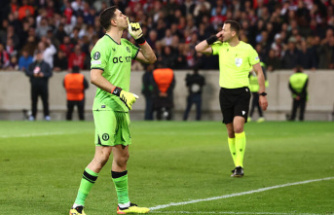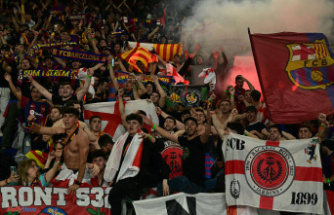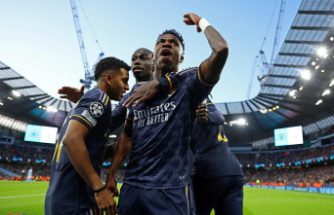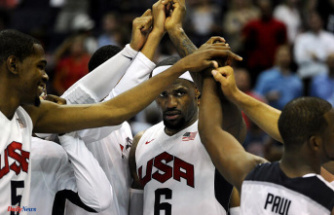New figures for this year suggest that it could rise to $2 billion. Big names such as Coca-Cola and Procter & Gamble are sponsors.
The so-called TOP sponsors of the International Olympic Committee are being squeezed by a diplomatic ban by the United States, the economic strength of 1.4 billion Chinese and the fear that China will retaliate.
China was part of a complete boycott of the 1980 Moscow Olympics.
"They (sponsors), are trying to walk the fine line between trying get the best exposure and also trying not to be perceived as being too close to Chinese government actions," Mark Conrad, who teaches sport law and ethics at Fordham University’s Gabelli School of Business, stated in an email.
The IOC caused the strain by returning home to a country that was well-documented for rights violations in the lead up to the 2008 Beijing Summer Olympics. With the Winter Games opening in February, they now compete with the pandemic.
Rights violations against Muslim Uyghurs, and other minorities, are in direct contradiction to the Olympic Charter's lofty principles. The Charter states that sport should be used to promote harmony and human development, as well as a peaceful society that preserves human dignity.
The Olympic Charter also states that "The enjoyment and enjoyment of the rights & freedoms set forth shall be secured without discrimination such as race, color sex, gender, sexual orientation, language or religion, national or social origins, property, birth, or any other status."
The Associated Press reached out to most major Olympic sponsors but was mostly met with silence or statements that they were not interested in discussing their plans. German financial services company Allianz responded that it was in regular contact with IOC and supported the Games' ideals.
A contact person with sponsors, who was unauthorised to speak and requested not to be identified, stated that the general mood was to avoid mentioning Beijing, particularly for those outside of the China market. He also suggested to keep the edge in mind.
Dae Hee Kawk director of the Center for Sports Marketing, University of Michigan, stated that "I wouldn't be surprised if the sponsors would remain quiet." "You could lose business."
It is not uncommon for people to retaliate. It happened to the NBA in 2019, when a Houston Rockets executive sided with democracy protests. Last month, Olympic sponsor Intel had an apology to make after it published a letter asking suppliers to refrain from sourcing from China's Xinjiang area.
Sponsors often occupy the area around the Olympics. This is less true now, with lucrative hospitality programs also being canceled by the pandemic.
Conrad, a Fordham sports law professor, wrote that silence of sponsors speaks volumes.
Sponsors were unable to participate in the delayed Tokyo Olympics due to the pandemic. Officials banned fans, closed an enclosure full of sponsor marquees and Toyota, Japan's third largest Olympic sponsor, pulled its ads from local TV to avoid being associated with the Olympics. Sponsors were then able to seek compensation from the IOC.
Although the Games were not popular in Japan at the time they were opened, polls revealed that they were viewed as a success once they had closed.
When asked about plans for Beijing by Toyota, Rina Naruke, a Toyota spokesperson, responded in a short statement to the AP.
"We are not able to give any details at the moment. Once we have more information, we will notify you.
Terrence Burns has been a marketing and branding specialist for the IOC, but is best known as an independent consultant who helped to land five successful Olympic bids. He disputed the suggestion that the Beijing Olympics were different or that sponsors were taking things lightly.
Burns sent an email to AP, stating that Beijing 2022's marketing opportunity has been to promote a Chinese Games on the Chinese market.
The Chinese market will have the biggest commercial impact on TOP partners' Beijing Games. This is not too dissimilar to any previous Games.
Burns stated that the IOC's sponsors were there for the long-term. Coca-Cola has been associated to the Olympics since 1928. The next Games are financially promising.
"I have not seen any commercial evidence that consumers are concerned or backlash against TOP partners." Burns stated that none.
The 2024 Olympics will be held in Paris. Next up, Milan-Cortina d'Ampezzo (Italy) and Los Angeles are the next Olympics. The IOC also announced Brisbane, Australia for the 2032 Summer Olympics. Sapporo (Japan) is the top contender for 2030 Winter Games.
The bid process that used to select host cities was no longer open for them. This was due to the well-reported corruption of some IOC rank-and-file members. Now, the IOC leadership selects venues after receiving rubber-stamp approvals from members.
Human rights activists and members of Congress have put pressure on IOC sponsors, calling for the removal of the Olympics or a complete boycott. An unofficial British body found that the Chinese government committed genocide, crimes against humanity and was established last month.
China calls this the "lie de siècle" and claims that the interment camps of northwestern Xinjiang can be used to train job candidates.
In July, the Congressional Executive Committee on China grilled five U.S.-based sponsors: Visa, Intel, Airbnb and Procter & Gamble.
Many of them avoided asking questions and said that they had to comply with Chinese law. They also denied any involvement in choosing Beijing for the Games.
Steven Rodgers of Intel, executive vice president and general counselor, was the only person among five to claim he believed that the U.S. State Department concluded that China was "committing genocide towards the Uyghur people."
In a letter to Human Rights Watch, Olympic sponsors and NBCUniversal (the broadcast rights holder for the United States) were asked to be aware about the rights climate in China and to examine supply chains.
Last month, President Joe Biden signed a bill that prohibits goods from the Xinjiang region in northwestern China. Companies must prove that forced labor was not involved.
NBC paid $7.75 Billion for the next six Olympics (2022-2032), and it is the main partner for nearly 40% of all IOC income. Although it has promoted the Olympics in the United States, it minimizes any references to Beijing.
Thomas Bach, President of the IOC, has stated repeatedly that the Olympics must be "politically impartial." But this is rarely true. Bach promoted his desire to promote talks between the Koreas at the Winter Olympics in Pyeongchang in South Korea four years ago.
The Olympic Truce Resolution was approved by the United Nations General Assembly late last year. It was unanimously adopted by 193 member countries; 173 of them co-sponsored it.
20 countries, including Australia, Japan, Canada and Australia, did not sign up to be co-sponsors. Future Olympic hosts are Australia and the United States, Japan held the Summer Olympics, is a candidate for 2030 and North Korea is China’s staunchest ally.
Bach declined to condemn the genocide and speak out about human rights in China. He rarely mentions the Uyghurs in name.
Bach stated, "We are focusing our attention on the athletes." "We are happy that they can participate and that their national governments support them. The rest is politics.












